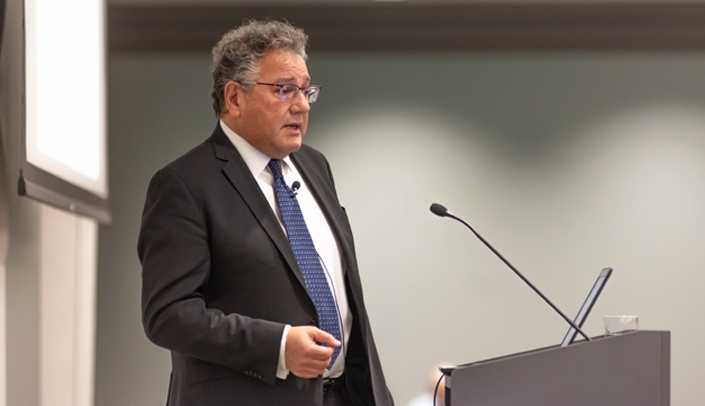Empathy is a powerful antidote to health care burnout.
That was the message from Helen Riess, M.D., who is known for her groundbreaking empathy training research.
On Wednesday, she highlighted the role of empathy in health care as part of UNMC’s annual Breakthrough Thinking Conference, which is designed to challenge and inspire out-of-the-box thinking.
The decline of empathy in health care, Dr. Riess said, has resulted in lower patient satisfaction scores, lower hospital reimbursements, low clinician job satisfaction and burnout, poorer medical outcomes and increased medical errors and malpractice claims.
“It’s not a trivial matter economically,” said Dr. Riess, who is an associate clinical professor of psychiatry at Harvard Medical School and director of the Empathy and Relational Science Program at Massachusetts General Hospital.
The good news? Empathy is a skill that can be taught, she said, referencing Empathetics, an online training program she co-founded to train physicians, nurses and frontline staff.
“When stress rises, empathy suffers,” she said. “When we don’t get as much meaning and joy and sense of purpose out of our jobs, we burn out,” she said.
Increased empathy, she said, also increases the patient’s – and provider’s – physiology.
Dr. Riess encourages providers to “take a walk in our patient’s shoes,” and focus on their chief concern, not simply their chief complaint. She stresses the importance of making eye contact with patients, especially with the use of electronic medical records in the clinic. It’s also important, she said, to read a patient’s facial expressions, display an open posture (rather than addressing patients with arms crossed), smile and use a warm tone of voice.
Wednesday’s speakers discussed an array of topics related to UNMC’s strategic plan to strengthen well-being and inclusivity and boost educational, research and clinical excellence.
“Magic does not happen in your comfort zone – that’s business as usual,” Chancellor Jeffrey P. Gold, M.D., said, challenging attendees to think broadly about how we all can better the health care profession. Don’t be afraid to ask “What if we.” or “why not try.” questions, he said.
“Nothing is impossible.”
